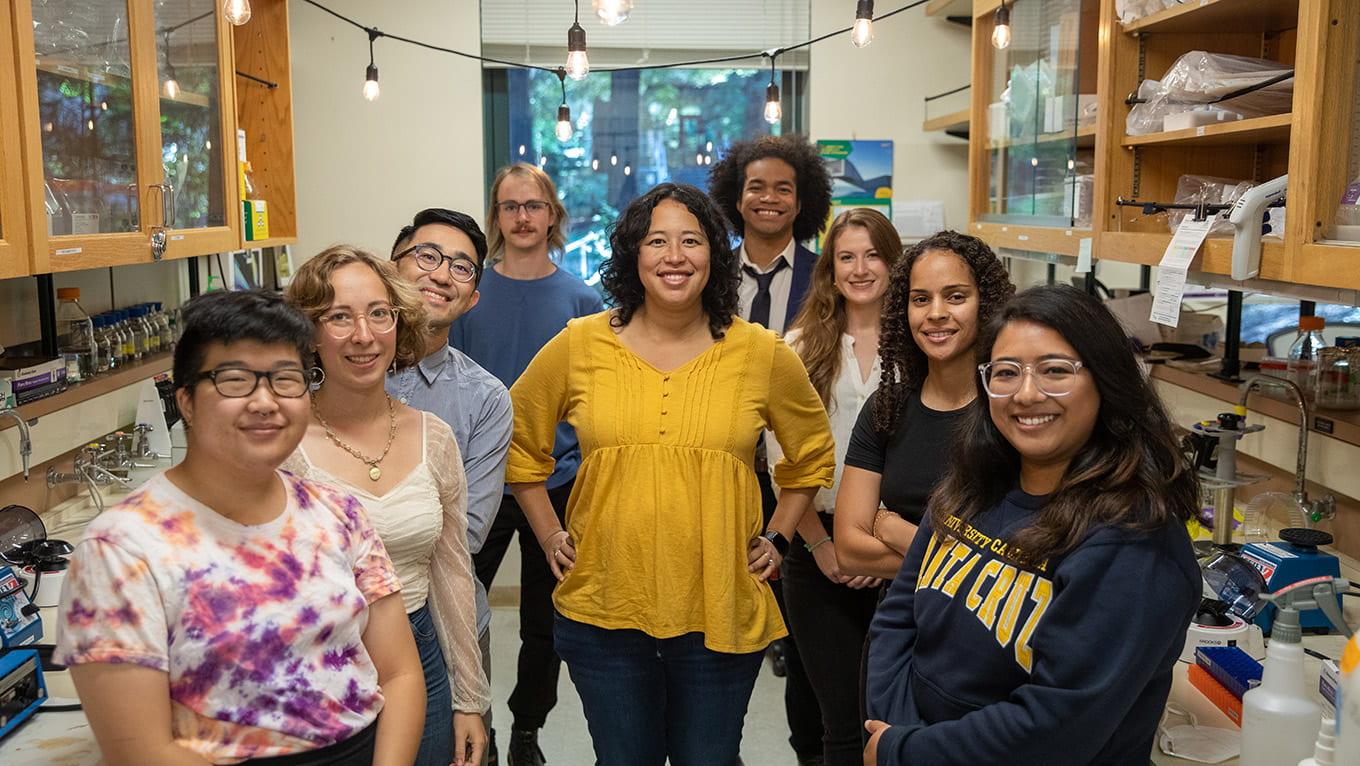Angela Brooks, associate professor of biomolecular engineering at UC Santa Cruz, has received an Outstanding Research and Professional Mentor Award from the Society for Advancement of Chicanos/Hispanics & Native Americans in Science (SACNAS).
The award, which was announced at the 2022 SACNAS National Diversity in STEM conference, is awarded to a faculty member who “has a demonstrated record of encouraging historically underrepresented minority students or professionals to pursue advanced degrees in a science, technology, engineering, mathematics or a related field.”
Alexis Thornton, a graduate alumna of UC Santa Cruz who first joined the Brooks Lab as an NIH Postbaccalaureate Research Education Program Fellow before deciding to pursue her Ph.D., nominated Brooks for the award and says that Brooks was instrumental in her own development as a scientist.
“I feel very fortunate to have a mentor who has been able to relate to and prepare me for the challenges and barriers that women of color may face in academia,” Thornton says in a letter nominating Brooks for the award. “I appreciate how Angela builds a sense of community and belonging in her lab. When I moved to Santa Cruz from Florida, I had no local support system, and Angela’s efforts to make me feel welcome made all the difference.”
Brooks’s community-building has extended beyond her lab. Thornton says that Brooks holds regular lunches for Black researchers throughout campus to provide them with a sense of community, and has advocated for them when there was vandalism on Blacks Lives Matter signs in one of the science buildings. She is also a founding member of the BME Graduate Diversity Committee, was the inaugural Genomics Institute Director of Diversity, and personally spearheaded the creation of the Genomics Institute’s Diversity, Equity, and Inclusion Committee.
Brooks has also participated in and initiated several programs to increase diversity in STEM even beyond the UC Santa Cruz campus. She created a program for students from a historically Black university, Southern University in Baton Rouge, to conduct funded summer research in her lab so they could gain a foundation in bioinformatics. She is also currently the Principal Investigator (PI) for the Genomics Institute’s Research Mentoring Internship Program (RMI), which annually supports 18 students from groups that are underrepresented in STEM.
Zia Isola, who manages the RMI program and many other diversity grants at the Genomics Institute, says Brooks has been an amazing mentor for the students, going above and beyond her role as PI.
“Dr. Brooks makes time to meet with RMI students one-on-one, mentoring them in a variety of ways, from discussing their grad school aspirations to helping them think through career paths,” Isola says.
Brooks, in collaboration with the Genomics Institute Diversity Committee, also created a free online summer short course in bioinformatics and coding for transfer students interested in the major which will now be an annual offering, free of charge to California Community College students. It is her hope that this new course will lower the barrier for transfer students who are interested in the Bioengineering & Bioinformatics major at UCSC.
Engaging in all of these mentoring efforts is time-consuming, but Isola says that Brooks “has seemingly endless enthusiasm for getting students from historically underrepresented groups involved in research.”
Brooks is currently working with fellow biomolecular engineering faculty member Russ Corbit-Detig to organize the Next Wave of Faculty in Genomics symposium, which will be held at UC Santa Cruz on May 2nd and aims to celebrate the research of diverse postdocs from around the country.




